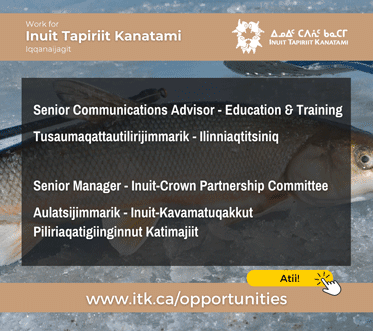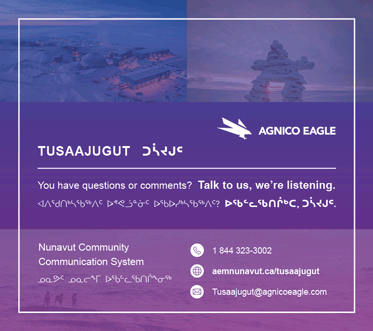Urban Inuit: An issue that won’t go away
Inuit in the cities need help to develop their communities
LISA KOPERQUALUK
In light of the recent “National Urban Inuit – One Voice” conference held Oct. 26 and 27 in Ottawa, the issue of the growth of the Inuit population in southern cities appears to be becoming an important element of Canadian life, and it’s not about to go away.
This conference was a great way to unite Inuit living in southern cities across Canada, and presented a forum for the exchange of ideas, concerns, and needs of Inuit living in urban centres. The participants at the conference were also introduced to the idea of a national body that could eventually represent them in the future.
As an Inuk person who has been living for many years in the big city, I feel I have not lost my identity as an Inuk. I am regarded as an Inuk by Qallunaat, by teachers, by colleagues, by my kids, by my friends, by Europeans, by Americans, and by my fellow Inuit too.
For some reason however, there is a negative stigma attached to being an Inuk choosing to live in a city. Other Inuit assume you are no longer an Inuk. One stigma of being an Inuk mother is that your are “not a good mother.” There is the stereotype of alcoholism and homelessness. Yet, the Inuk who is working in the city chooses to do this. This Inuk has a fundamental right to live where she or he wants.
Definitely, homelessness is a major problem, and there is a need for Inuit-specific services. Inuit mothers losing custody of their children need support, and social workers in the city need education on Inuit society. There is also a need for Inuit daycare and para-legal services in the cities.
This is why it is important for the Inuit living in places like Edmonton, Yellowknife, Montreal, Goose Bay, St. John’s, and Winnipeg to mobilize and strengthen their communities. Right now, the Ottawa Inuit are the best organized community, with an annual source of revenue that provides them with opportunities to do this.
The Association of Montreal Inuit has existed for the last six years but needs to expand. Edmonton’s Inuit are starting community activities and are on their way to setting up an association, and others are expressing their needs as well.
There are challenges for the growing number of Inuit living, for example, in Montreal, where Inuit live among four million other people and are quite dispersed – it can become complicated to physically meet together at a centre that is easily accessible for everyone. There is much work to be done.
Yes, there are urban aboriginal funding sources from the federal government, but most of it goes to non-Inuit aboriginal projects. And yes, there is undercounting of urban Inuit, and this can be countered by Statistics Canada having better counting methods, especially of homeless Inuit. An Inuit centre dedicated to Inuit living in the city could answer such needs. But such a centre needs people, dedicated people, and money.
In Montreal for example, it could help answer questions such as how does a Nunavut Inuk who has just died in Montreal get returned to their Nunavut home community for burial?
Very often, beneficiaries of a land claims region are not aware of all of the services they are entitled to, when the information is out there, but not readily available. Sometimes they find out the hard way.
For instance an Inuk in Montreal wishes to start a business that would benefit Nunavik, but when she or he applies for funding from the Regional Development Council there is an immediate refusal because she or he lives outside of the region. How alienating for an Inuk to be told this by the very organization that is supposed to be there to support them!
Basically, all this points us to Inuit identity and the link to identity and our land. Does it mean that if we no longer live on our land that we are no longer Inuit? Our tie to our homeland gets cut if we move out?
However, this is not to say that land claim organizations do not do their share in contributing toward Inuit qallunaanimiut. The Labrador Inuit Association maintains its Inuit members as beneficiaries even when they move away from home. The Makivik Corp. has done a great deal in helping out the Association of Montreal Inuit in organizing its monthly feasts.
In the past five years, Makivik has donated $42,000 each year, part of which goes to the expense of the monthly feasts, and a major part of which goes towards purchasing used but good-condition furniture to send up north for those who contribute food to the Montreal Inuit. Makivik has also on several occasions aided Inuit who need to go home because of a death.
Some of these issues remain to be discussed, and, it’s hoped, to be resolved in the future. Out of the urban Inuit conference came a resolution, a resolution in the mind, that only by becoming involved in the development of our Inuit communities will we create better and stronger Inuit communities in the cities.
Lisa Koperqualuk is an Inuk from Nunavik who has lived in Montreal for many years.





(0) Comments